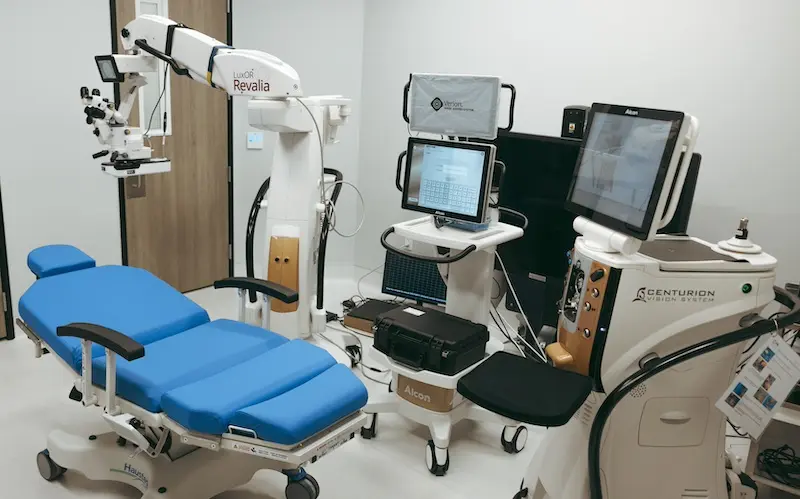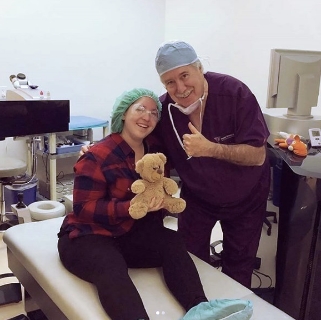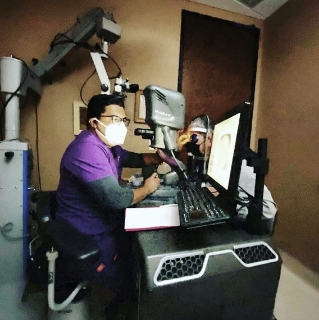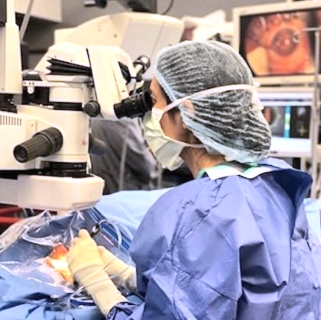Cataract Surgery
The eye doctors and experienced cataract surgeons at Gordon Schanzlin New Vision Institute in San Diego specialize in cataract treatment. As a leading vision practice, we offer personalized, effective eye care, including laser assisted cataract surgery and advanced lens implant (IOL) options.

- What is a Cataract?
- What Causes Cataracts?
- Symptoms of Cataracts
- How is a Cataract Diagnosed?
- Who Gets Cataracts?
- Cataract Risk Factors
- Treatment for Cataracts
- Laser Cataract Surgery
- What To Expect From Cataract Surgery
- Cataract Surgery Recovery
- Risks of Cataract Surgery
- Intraocular Lens (IOL) Options
- Frequently Asked Questions About Cataracts
What is a Cataract?
Over time the lens, which lies behind the iris and the pupil, begins to cloud. This clouding of the lens is a cataract.

What Causes Cataracts?
Cataracts are an accumulation of protein in the eye’s lens, and are most commonly a natural result of aging.
The eye’s lens is made primarily of water and protein. In a healthy eye, In a healthy eye, the lens refracts light onto the retina to produce a clear image. At around the age of 40, the protein in the lens begins to break down and form clumps. Cataracts are a result of this accumulation of protein on the eye’s lens.
This clouding of the lens may not be noticeable at first, but by the age of 60 most people begin to experience blurred vision or other symptoms of cataracts. The only way to remove cataracts is to replace the clouded lens of the eye with an artificial lens. By the age of 80, more than
Trusted Source
Cataracts
National Eye Institute
Go to Source
50% of Americans
either have cataracts or have already undergone cataract surgery.
Symptoms of Cataracts
- Blurred vision, like looking through a cloudy piece of glass
- Light sensitivity, including sensitivity to lights at night that can cause glare
- Diminished brightness that makes colors appear muted or muddy
How is a Cataract Diagnosed?
The only way to be sure you have a cataract and to determine the proper treatment is to see an experienced eye doctor for a comprehensive eye exam. There are several tests your eye doctor can use to determine if you have a cataract, including a retinal exam, a refraction and visual acuity test, and a slit-lamp exam, which is a type of microscope. All of these tests are
Trusted Source
Cataracts Diagnosis & Treatment
Mayo Clinic
Go to Source
painless
.
Who Gets Cataracts?
Although they are associated with older age, anyone can have cataracts. You can develop a cataract as the result of an eye injury, and in rare cases even infants can have congenital cataracts. However, they are most common with aging – more than 22 million people over the age of 40 have cataracts and most people have had a cataract by the age of 80.
Cataract Risk Factors
There are certain
Trusted Source
What Are Cataracts?
American Academy of Ophthalmology
Go to Source
risk factors
, in addition to age, that can increase the likelihood of developing cataracts.
- Genetic predisposition
- Sunlight and UV exposure
- Smoking
- Excessive alcohol consumption
- Hypertension (high blood pressure)
- Previous eye surgery
- Diabetes
- Prolonged use of certain medications, such as corticosteroids
- Obesity
- Previous eye injuries

Treatment for Cataracts
Cataract surgery is the only way to remove a cataract, but if you are diagnosed with a cataract you may not need surgery right away. In the early stages of a cataract, many patients are able to relieve their vision symptoms with brighter lights or updated prescriptions. However, as a cataract progresses, vision symptoms will begin to interfere with your quality of life and may prevent you from driving safely or enjoying hobbies such as reading, crafting, or watching television. At that point, it is time to discuss cataract surgery with your eye doctor.
Laser Cataract Surgery

Gordon Schanzlin New Vision Institute was among the first ophthalmology practices to employ the LenSxⓇ Femtosecond Laser for blade-free cataract surgery. The LenSx® Femtosecond Laser performs corneal incisions and anterior capsulotomies using light energy that is meticulously customized for each patient’s unique eye structure.
Not only does this state-of-the-art tool reduce the risks associated with typical cataract surgery, but it also makes the procedure more accurate and efficient and is more effective in treating astigmatism than traditional cataract surgery. Learn More About Laser Cataract Surgery
What To Expect From Cataract Surgery
The cataract surgeons at Gordon Schanzlin New Vision Institute utilize state-of-the-art technology to offer advanced cataract removal procedures. Blade-free, laser assisted cataract surgery has many benefits, including greater precision and customized treatment. Numbing drops are used to make the procedure pain-free. Your surgeon will remove the clouded lens and replace it with an artificial lens called an intraocular lens (IOL).
Cataract Surgery Recovery
Each patient has a unique experience, but typically you will be able to resume regular activities within a few days after surgery. You may temporarily experience blurry vision immediately after surgery, but you will soon notice that colors are brighter and your overall vision is more clear. Temporary, mild discomfort in the day or two after surgery is normal, and it is important to follow all post-surgical instructions and see your eye doctor for all scheduled follow-up appointments.
Risks of Cataract Surgery
Cataract surgery is one of the most frequently performed surgeries in the U.S. and it is widely regarded to be a safe and effective procedure. Of course, any surgery carries some risk of side effects or complications. Potential
Trusted Source
Cataract Surgery
National Eye Institute
Go to Source
risks of cataract surgery
include:
- Swelling, bleeding, or infections
- Vision changes
- Eye pressure complications
- Retinal detachment
- Secondary cataract (posterior capsule opacity)

Intraocular Lens (IOL) Options
The traditional lens option for cataract surgery is a monofocal IOL that is designed to correct your vision at one focusing point. Many patients will still need glasses or contacts for reading or to correct distance vision or astigmatism after surgery with a monofocal lens. However, there are advanced IOL options that can correct multiple vision issues. Toric, Multifocal, Trifocal, and Accommodative IOLs can reduce or eliminate the need for glasses. Learn More About IOL Options.
Frequently Asked Questions About Cataracts (Cataract FAQ)
Can I prevent cataracts?
Not exactly – many people will develop cataracts and there is a strong genetic component to this condition. The older you get, the more likely you are to develop cataracts. However, you may be able to reduce your cataract risk by quitting smoking, eating a healthy diet with a variety of fruit and vegetables, and protecting your eyes from sunlight.
Can I have blurry vision in just one eye from a cataract?
Cataracts typically develop in both eyes, but you may experience symptoms in one eye first.
My doctor advised me to wait before removing the cataract. Why?
Your doctor is probably advising you to wait until the cataract grows to the point of interfering significantly with your vision. You need to continue to visit your eye doctor regularly to monitor the cataract’s progress. Some cataracts never quite reach the stage where they should be removed. If your cataract is interfering with your vision to the point where it is unsafe to drive, or doing everyday tasks is difficult, then it’s time to discuss surgery with your doctor.
Can cataracts grow back?
No, cataracts do not grow back. This common cataract myth is likely based on a condition called posterior capsule opacity, which is also known as a secondary cataract because it can cause blurred vision. Some patients may develop this condition in the weeks or months after cataract surgery. Your eye doctor can perform a quick, painless procedure to correct posterior capsule opacity.
How much does cataract surgery cost?
Cataract treatment is typically covered by health insurance, but most insurance plans will only cover monofocal lenses. The overall cost of your surgery can vary depending on your customized treatment plan. Patients who choose to pay out-of-pocket for advanced IOL options may be eligible for financing options.
Contact Us For Cataract Treatment in San Diego
Our team is dedicated to caring for your vision and eye health. Contact us with any questions or to schedule your consultation appointment.





The Patient Experience
I recently had cataract surgery in both eyes. The procedure was painless, efficient and I am thrilled with the vision in both my eyes. It feels like a miracle to be able to see without contacts or glasses! Dr Michael Gordon is a superstar! My follow up appointment today was with Dr. Pust and she was thorough, professional and so sweet. Trust this practice with your eyes! I have since 1987 and I highly recommend them.
1 National Eye Institute. Cataracts. Available: https://www.nei.nih.gov/learn-about-eye-health/eye-conditions-and-diseases/cataracts. Accessed August 11, 2020.
2 Mayo Clinic. Cataracts Diagnosis & Treatment. Available: https://www.mayoclinic.org/diseases-conditions/cataracts/diagnosis-treatment/drc-20353795. Accessed August 11, 2020.
3 American Academy of Ophthalmology. What Are Cataracts? Available: https://www.aao.org/eye-health/diseases/what-are-cataracts. Accessed August 11, 2020.
4 National Eye Institute. Cataract Surgery. Available: https://www.nei.nih.gov/learn-about-eye-health/eye-conditions-and-diseases/cataracts/cataract-surgery. Accessed August 11, 2020.
The doctors at Gordon Schanzlin New Vision Institute have either authored or reviewed and approved this content.
Page Updated:



